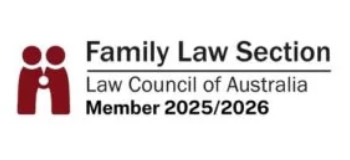Parenting Arrangements After Separation - Your Children Deserve Certainty and Stability
You’ll be supported with empathy, clarity and a plan that puts the best interest of your children first
You're Not Just Navigating the Law - You're Protecting Your Child's Future
Most parents arrive here feeling overwhelmed. Afraid of losing time with their child. Anxious about what’s fair. Unsure of how this will affect their child in the long-term.
Whether you are still together and planning ahead, already separated, or stuck in a slow or unfair process, you deserve clarity.
Our first step? Understanding what matters most to you and your child. Explaining how the law applies to your situation, and then work with you to identify the legal path around that.

Here’s What Happens When You Contact Your Parenting Lawyers...
Talk With an Experienced Lawyer
Quick response – no delays and you will speak with a expert, understanding lawyer who cares.
Get Clear Answers About Your Rights
We’ll explain what’s possible and how the law applies to your specific case - in simple, plain English.
Feel Clear and Confident Moving Forward
Whether you engage us or not, you’ll leave the call with certainty and direction.

One size never fits all - your custody (parenting) arrangements should fit your children
Every family is different. Some clients want peace of mind to know what they are doing is in line with the law, and to avoid Court. Others need to protect their time with their children, and others have serious safety concerns such as domestic violence, drug/alcohol misuse or mental health concerns.
Some come to us partway through a case, frustrated that they aren’t being heard or things aren’t moving.
Your lawyer asks: What do you want to achieve?
Then your lawyer will explain the legal framework and develop a strategy tailored to your goal. And if you don’t need legal assistance, we’ll let you know.
Trusted & Recognised Memberships, Associations and Affiliations






Real Parents. Real Outcomes. Real Peace of Mind
Trustindex verifies that the original source of the review is Google. Very happy with the service, advice I received from Skye, Felicity and team. Very professional, and listened to my needs to provide good advice. Highly recommendTrustindex verifies that the original source of the review is Google. Jill and the team are professional, responsive and very knowledgeable. I have no reservations in recommending the law peopleTrustindex verifies that the original source of the review is Google. Jill Johnstone and The Law People team always provide exceptional service from start to finish which is why Rouse Lawyers confidently refers its clients who need expert and experienced family law solicitors to them. The Law People know how to guide clients through every step, making potentially stressful situations more manageable. Clients benefit from The Law People’s incredible knowledge and genuine care for client well-being.Trustindex verifies that the original source of the review is Google. Jill and the team are fantastic. I highly recommend them for any family law matters.Trustindex verifies that the original source of the review is Google. The staff at The Law People are total pros. They are friendly, supportive and above all they get results. Highly recommend, particularly if you are a woman who is nervous about being taken seriously.Trustindex verifies that the original source of the review is Google. Wonderful team to work with.Load more


Led by an Accredited Family Law Specialist
When everything feels uncertain, it helps to know you’re being guided by a team led by one of Queensland’s most qualified family lawyers.
Less than 3% of solicitors in Queensland hold the title of Accredited Specialist in Family Law. It’s not a marketing term – it’s formal recognition from the Queensland Law Society that Jill Johnstone, Principal of The Law People, is among the top-tier experts in the state.
For you, that means:
- Advice that’s precise, strategic and fully aligned with current legal standards
- Representation from someone trusted by peers, judges, and clients alike
- Fewer delays, fewer missteps, and a smoother path to resolution
In complex or high-stakes matters – especially involving children, property, or financial disputes – that level of expertise can make a real difference in your outcomes.
What truly sets this team apart is that legal skill never comes at the expense of personable service. You’ll feel it from the first conversation – real understanding, practical advice, and guidance that puts your best interests at the centre.
So if you’ve been searching for family law advice you can truly trust – you’ve just found it.
How Parenting Arrangements Work After Separation
- Parenting Plans vs Court Orders: What’s legally binding? What isn’t? A parenting plan is a non-enforceable agreement, whereas a Court Order is.
- Best Interests of the Child: This is how the Court decides on the arrangements for the children, taking into account safety, stability and wellbeing.
- Equal Time Splits: Equal time isn’t always the answer. Your lawyer will help you achieve what’s best for your child.
- Health Needs: If your children have health needs (including a neurodivergent diagnosis), this will be considered when working out what the living arrangements look like.

Quick Answers to Questions You’re Probably Asking
Parenting after separation can feel overwhelming, from working out where the children will live, to how time will be shared, to making decisions about schooling, health and day-to-day care. It’s normal to feel uncertain about your rights and responsibilities, or worried about how the changes will affect your children.
Below, we have answered some of the most common questions parents ask when navigating these issues. This information is general guidance only and not legal advice. For advice specific to your family, please contact The Law People to speak with an experienced family lawyer.
Will the Court automatically give 50/50 care?
No, the Court does not automatically order 50/50 care.
While the law previously allowed for consideration to be given to an equal time arrangement (if certain conditions were met), this changed in May 2024. The focus is now entirely on what’s in the best interests of the child, with no automatic preference for equal time.
The Court considers things like the child’s relationship with each parent, practical arrangements, safety, and the child’s views (depending on their age and maturity). In some cases, equal time is appropriate, in others, it’s not and the arrangements for each family entirely turn on their own set of facts.
Navigating this can feel overwhelming, but you don’t have to figure it out alone. We can help you understand how the law applies to your family’s circumstances and build a plan that works and keeps your child’s wellbeing front and centre.
Do I need a lawyer to go to court for parenting?
You don’t have to have a lawyer, however having the right legal support can make a world of difference.
With the recent changes to family law, including the new criteria for determining parenting arrangements and a stronger focus on children’s safety and views, understanding your rights (and obligations) can feel daunting. The Court still expects you to follow the proper rules and present your case clearly, whether you have a lawyer or not.
We’re here to take that pressure off you. With us in your corner, you will feel confident, informed, and supported every step of the way. We’ll help you prepare thoroughly, avoid costly missteps, and focus on getting the best possible outcome for you and your children.
How is time usually split between parents?
There’s no one-size-fits-all arrangement. The way time is shared depends entirely on the unique needs of your child, the logistics of your lives, and the broader circumstances of your separation. Common setups include:
- Equal time (week-about),
- A 5–2 split,
- Primary care with one parent and regular time with the other,
- Supervised or limited contact, in high-risk situations.
Under the new family law reforms, the Court uses a simplified list of factors to assess what’s in a child’s best interests, focusing on things like safety, stability, and maintaining strong relationships.
We can help you work out what’s safe, practical, and in your child’s best interests, whether that’s by agreement or through the Court process. Having us on your side means less stress, less confusion, and a clear path forward.
This is About More Than Law - It's About Your Children
You deserve to feel confident about your child’s future. Let’s take the next step together.
Parenting Arrangements After Separation - Frequently Asked Questions
How do I get sole custody of my child?
In Australia, the law doesn’t use the term “custody” anymore – instead, it talks about parental responsibility (who makes the major decisions about a child’s life) and living arrangements (who the child lives with and spends time with).
To get “sole custody,” you would usually be asking the Court to grant you sole parental responsibility and for the child to live primarily with you. This is only ordered in cases where it is in the best interests of the child, often where there are concerns about family violence, abuse, neglect, or an inability of the other parent to care safely for the child.
Every case is different. If you are seeking sole parental responsibility or restrictions on the other parent’s time, you will need to provide evidence showing why such an order is necessary to protect your child’s welfare. The Court’s guiding principle is always the child’s best interests.
What are child custody schedules by age?
Parenting arrangements are designed around the developmental needs of children, so the schedule often depends on their age and stage:
- Babies and toddlers (0–3 years): Short but frequent visits with the non-primary parent are common, to help build attachment without disrupting routines like feeding and sleep.
- Preschoolers (3–5 years): Time can gradually lengthen, including overnights, while keeping consistency around daily care.
- Primary school children (6–12 years): Schedules often expand to include regular weeknights, alternate weekends, and shared school holidays.
- Teenagers (13+ years): Teens usually have more say in arrangements. Schedules are more flexible to fit around school, activities, and social lives.
There’s no fixed “one-size-fits-all” schedule. The Court and mediators encourage arrangements that are practical, child-focused, and tailored to each family. What matters most is stability, safety, and supporting the child’s relationship with both parents (where safe to do so).
Can I represent myself in parenting proceedings?
Yes, you can represent yourself in family court proceedings. Some parents do, particularly in early stages of the Court process. However, parenting matters can be legally and emotionally complex, especially when safety concerns, relocation, or high conflict are involved.
Self-represented parties are still expected to follow all court rules and procedures, which can be overwhelming without legal training.
How do we explain the separation to the children?
There’s no perfect script, but honesty and reassurance are key. It’s important to:
- Let children know the separation is not their fault,
- Emphasise that both parents still love them and will continue to care for them,
- Be age-appropriate, calm, and consistent in what you say,
- Avoid blaming the other parent or sharing adult details.
It can help to plan the conversation together (if safe), maintain routines, and give your children space to ask questions.
Can grandparents apply for time with the children?
Yes. Under the Family Law Act 1975, grandparents (and other significant people in a child’s life) can apply to the court for parenting orders. The Court does not presume automatic rights for grandparents, but it will consider whether time with them is in the child’s best interests, especially where there has been an existing and meaningful relationship.
If agreement cannot be reached with the parents, legal avenues are available to seek formal arrangements.
What happens if the other parent won’t follow the agreement or court orders?
If the other parent does not follow a parenting agreement or court order, the next steps depend on the type of arrangement:
- If it’s a parenting plan (not legally binding), you may need to revisit negotiations or apply for parenting orders to formalise the agreement.
- If it’s a court order, you can apply to the Court to enforce the order. The Court can issue penalties, vary the order, or change time arrangements in serious cases.
- Enforcement through the Court can be difficult and complex. We strongly recommend that you speak with The Law People to understand your options before making a Corut application.
What if I’m worried about my child’s safety with the other parent?
If you believe your child is at risk in the other parent’s care, due to family violence, abuse, neglect, substance use, or other serious concerns, it’s important to act. You may need to:
- Refuse handover if there is a serious and immediate risk,
- Apply to the Court for urgent parenting orders,
- Seek a protection order (AVO, DVO) to safeguard your child.
The Court prioritises child safety and will consider all risks when making or adjusting parenting arrangements.
If there are serious concerns about safety, we strongly recommend speaking with one of our lawyers who can help you work out what’s safe, practical, and in your child’s best interests, whether that’s by agreement or through the Court process. Having us on your side means less stress, less confusion, and a clear path forward.
Can I stop contact if there’s family violence?
If there is family violence or a genuine concern for your child’s safety, you may be justified in withholding contact, but this should be carefully considered and we strongly encourage you to speak with us first. The Court expects parents to comply with existing parenting orders, so if you stop contact without legal grounds, it may affect your case.
If there’s an immediate risk, you can possibly:
- Seek a family violence order (DVO),
- Apply for urgent parenting orders,
- Contact police or child protection if necessary.
The Court will take evidence of family violence seriously and may order supervised contact or suspend time altogether, depending on the circumstances.
If there are serious concerns about safety, we strongly recommend speaking with one of our lawyers who can help you work out what’s safe, practical, and in your child’s best interests, whether that’s by agreement or through the Court process. Having us on your side means less stress, less confusion, and a clear path forward.
What if my ex is using drugs or alcohol?
If drug or alcohol use is affecting your child’s safety or wellbeing, the Court can consider this when making or reviewing parenting arrangements. You may need to provide evidence such as:
- Affidavits,
- Reports from professionals,
- Drug or alcohol test results (if available).
Depending on the risk, the Court may order:
- Supervised time,
- No overnight stays,
- Abstinence conditions (e.g. no drug use before visits),
- A complete pause on contact until it’s safe.
If there are serious concerns about safety to the child/ren as a result of drug and/or alcohol use, we strongly recommend speaking with one of our lawyers who can help you work out what’s safe, practical, and in your child’s best interests, whether that’s by agreement or through the Court process. Having us on your side means less stress, less confusion, and a clear path forward.
Can I get a no-contact order for my child?
Yes, in serious cases where a parent poses a risk to the child’s safety or wellbeing, the Court can make an order that there be no contact between the parent and child. This is usually only done in situations involving:
- Serious family violence,
- Abuse or neglect,
- Severe substance abuse,
- Complete lack of engagement or capacity to parent safely.
The Court will always prioritise the best interests of the child, and in most cases will aim to preserve some level of connection. It is somewhat rare for a Court to order that there be zero contact between a children and a parent.
If there are serious concerns about safety, we strongly recommend speaking with one of our lawyers who can help you work out what’s safe, practical, and in your child’s best interests, whether that’s by agreement or through the Court process. Having us on your side means less stress, less confusion, and a clear path forward.
What are my rights if I have an AVO or protection order?
If you or your child are protected by an Apprehended Violence Order (AVO) or Domestic Violence Order (DVO), this can affect parenting arrangements. A protection order may:
- Prohibit contact between the parents,
- Require supervised contact with the child,
- Impact handover arrangements.
A parenting order made by the Family Court can override a protection order, but the Court will consider the conditions of any existing protection order when making parenting decisions.
It’s important to make sure all orders are clear, consistent, and safe to follow.
We strongly recommend speaking with one of our family lawyers about any AVO/DVO that is in place to ensure inadvertent breaches do not occur.
What is family dispute resolution (FDR)?
Family Dispute Resolution (FDR) is a mediation process designed to help separated parents reach agreement about parenting arrangements without going to court. It is conducted by accredited Family Dispute Resolution Practitioners, and often required before applying to court for parenting orders.
At FDR, both parents are supported to:
- Identify the issues in dispute,
- Explore possible solutions,
- Try to reach a parenting agreement.
If agreement is not reached, the practitioner may issue a section 60I certificate, which allows you to proceed to court. FDR is not appropriate where there are serious safety concerns or a history of family violence.
Do I need a parenting order from the court?
Not necessarily. You only need a parenting order if:
- You and the other parent can’t reach agreement, or
- You want your agreement to be legally binding and enforceable.
Parents can make informal arrangements or create a parenting plan (a written agreement signed by both parties), which isn’t legally enforceable but can work well if both parents are cooperative.
If certainty, enforceability, or protection is needed, especially where there is conflict or risk, you can apply to the Court for consent orders (if you agree) or parenting orders (if you don’t).
What happens in court if we can’t agree?
If you and the other parent can’t agree, the Court will hear evidence and make decisions based on what is in the best interests of the child.
The process usually includes:
- Filing court documents,
- Attending interim hearings for short-term arrangements (if necessary),
- Attending a final hearing if the matter doesn’t resolve earlier,
- Providing evidence through affidavits, reports, and sometimes expert opinions (like family consultants or independent children’s lawyers).
The Court may make temporary or final parenting orders that determine how much time the child spends with each parent, who makes decisions, and how contact occurs.
How does the Court decide who the child lives with?
The Court does not make decisions based on parental rights — it decides based on the best interests of the child, as set out in section 60CC of the Family Law Act 1975.
Key considerations include:
- The child’s safety (including any history of family violence),
- The child’s relationship with each parent and significant people,
- The benefit of the child having meaningful relationships,
- The child’s views (depending on age and maturity),
- Practical considerations like schooling, housing, and routines.
The outcome depends entirely on the facts of the case – not on assumptions of 50/50 care or parental entitlement.
Can I move interstate or overseas with my child?
You cannot move your child to another state or country without the other parent’s agreement or a Court order, if such a move would impact existing parenting arrangements or the other parent’s ability to spend time with the child.
If you relocate without consent or an order, the other parent can apply to the Court for:
- A recovery order, requiring you to return the child,
- An injunction preventing the move.
If agreement can’t be reached, the Court will decide whether relocation is in the child’s best interests, considering the impact on the child’s relationship with each parent and the practicality of maintaining that relationship.
Can my ex take the kids on holidays without my permission?
It depends on your parenting arrangements and whether any court orders are in place.
- If there are no orders, each parent generally has the right to take the children on a local or interstate holiday during their time, provided it doesn’t interfere with the other parent’s agreed time.
- If there are parenting orders, the terms of the orders must be followed. Some include restrictions or require written consent for travel.
Overseas travel usually requires both parents’ written consent, unless a court order states otherwise. If you’re concerned about travel plans, especially international, you should seek legal advice promptly.
Can I stop my ex from taking the children overseas?
If there are no parenting orders, either parent can take a child overseas with a valid passport, unless the other parent objects. However, if there are Court orders in place, taking the child overseas usually requires:
- The written consent of both parents, or
- A specific Court order permitting the travel.
If you’re concerned your ex may take the children overseas without permission, you can apply to the Court for:
- An order preventing international travel, or
- Placement of the child’s name on the Family Law Watchlist (formerly the Airport Watch List), which notifies the Australian Federal Police if someone tries to remove the child from the country.
These are complex cases to run through the Court, and we strongly recommend speaking with The Law People before making a Court Application.
What is an airport watch list?
The Family Law Watchlist (commonly referred to as the airport watch list) is maintained by the Australian Federal Police. It is designed to prevent children from being taken out of the country without consent or in breach of a court order.
To place a child on the watch list, you must:
- Apply to the Court for a parenting order or injunction to prevent international travel,
- Request that the Court direct the AFP to place the child on the list.
Once on the list, alerts are triggered at international departure points if an attempt is made to take the child overseas. The watch list remains active until the Court orders removal.
Who gets custody of the children after separation?
Australian law does not use the term “custody.” Instead, it refers to parental responsibility and living arrangements.
After separation, both parents generally retain equal shared parental responsibility, meaning they jointly make long-term decisions (e.g. about schooling, health, religion). This doesn’t mean the children live with both parents equally.
Living arrangements depend on the child’s best interests. The law encourages meaningful involvement with both parents, where safe and practical, but does not favour any default arrangement. Time may be shared in a range of ways depending on the family’s situation.
Do I have to let my ex see the kids?
If there are court orders in place, both parents are legally required to comply with the arrangements. Failing to do so can result in enforcement proceedings or changes to the orders.
If there are no orders, and there are no safety concerns, it is generally expected that children spend time with both parents. However, if you believe your child is at risk, you may be justified in refusing contact, but this should be backed by legal advice or Court orders.
The Court prioritises the child’s safety and wellbeing, but also values the benefit of the child having a relationship with both parents where it is safe.
Can we do week-about (shared care)?
Yes, many separated parents choose a week-about or 50/50 shared care arrangement, especially where:
- The parents live close to each other,
- Communication is respectful and cooperative,
- The child is able to move between households without disruption.
However, shared care is not suitable for every family. The Court will only order equal time if it is in the child’s best interests and reasonably practicable — which includes considering the logistics of school, work, and emotional stability for the child.
Week-about works well when parents can manage routines consistently and support the child’s relationships in both homes.
What if I want my child to live with me full-time?
If you believe it’s in your child’s best interests to live with you full-time, this can be arranged:
- By agreement with the other parent, through a parenting plan or consent orders, or
- Through the Court, if agreement cannot be reached.
The Court does not automatically favour one parent over the other. It will consider factors such as:
- The child’s relationship with each parent,
- The child’s safety and wellbeing,
- Practical matters like housing, schooling, and routine,
- Any risks (e.g. violence, substance abuse, instability).
Each case is assessed on its individual facts, and the Court’s priority is the child’s best interests.
Can I stop my ex from having overnight visits?
You can withhold overnight time only if there are valid concerns about the child’s welfare, for example, if the child is very young, unsettled by overnights, or there are safety issues like family violence, alcohol misuse, or unsuitable accommodation.
If you have an informal arrangement or parenting plan, you can try to renegotiate terms. If there’s a court order in place, you must follow the order unless:
- The Court varies the order, or
- You can demonstrate an urgent risk justifying a temporary departure.
Any refusal of overnight visits should be based on the child’s best interests, not parental conflict.
What is supervised time?
Supervised time means that a parent spends time with the child while being observed by a third party, such as:
- A professional contact centre,
- A trusted family member or friend (agreed or court-appointed).
Supervised time is often used where:
- There are safety concerns, such as past violence or substance misuse,
- A parent is rebuilding a relationship with the child after a long absence,
- The Court considers the risk too high for unsupervised time.
Supervision provides a safe environment for children to maintain contact while protecting their emotional and physical wellbeing.
What happens on birthdays and holidays?
Special occasions like birthdays, Christmas, school holidays, and religious celebrations are commonly addressed in parenting plans or court orders.
Parents often agree to:
- Alternate holidays each year,
- Split the day (e.g. one parent has the child in the morning, the other in the afternoon),
- Share or rotate school holidays and long weekends.
If no agreement is in place, and parents can’t decide together, either party can apply to the Court to set out arrangements that reflect the child’s best interests and support both parental relationships.
Can we agree to different arrangements as the children grow?
Yes, parenting arrangements should evolve as children grow and their needs change. What works for a toddler may not suit a teenager.
If you have a parenting plan, it can be updated at any time by agreement. If you have court orders, you’ll need to either:
- Vary them by consent, or
- Apply to the Court to change the orders, showing a significant change in circumstances.
Changes may relate to school, health needs, work schedules, or a child’s own preferences as they mature.
What is a parenting plan?
A parenting plan is a written agreement between parents about the care and arrangements for their children after separation. It can cover:
- Living arrangements and time with each parent,
- Communication,
- Travel and holidays,
- Decision-making about education, health, and other important matters.
To be valid, a parenting plan must:
- Be in writing,
- Be signed and dated by both parents,
- Be made freely (without threats or coercion).
Parenting plans are not legally enforceable, but courts may consider them if a dispute arises later.
What’s the difference between a parenting plan and parenting orders?
A parenting plan is an informal, flexible agreement between parents, it’s not enforceable by law.
Parenting orders are made by the Court and are legally binding. These can be:
- Made by consent (if parents agree), or
- Ordered by a judge after a hearing (if parents can’t agree).
If a parenting order is breached, the Court can impose consequences, including make-up time, fines, or changes to the orders.
You can ask the Court to turn your parenting plan into consent orders to make it enforceable.
Do I have to go to court to make parenting arrangements?
No, you don’t have to go to court if you and the other parent can reach an agreement.
You can:
- Make a parenting plan (informal),
- Apply for consent orders from the Court (legally binding, but no court appearance needed).
You only need to go to court if:
- You can’t agree on arrangements, or
- There are safety concerns requiring court intervention.
In most cases, you must attempt Family Dispute Resolution (FDR) before applying to the Court, unless an exemption applies.
How do I make parenting arrangements legally binding?
To make parenting arrangements legally binding, you must apply to the Court for consent orders or have the Court make parenting orders after a hearing.
Consent orders:
- Are used when both parents agree,
- Are filed with the Court using an application and draft terms,
- Do not require a court appearance,
- Are enforceable by law once sealed by the Court.
Parenting plans, while useful, are not enforceable unless converted into court orders.
Can we agree on parenting without lawyers or court?
Yes, many separated parents work out parenting arrangements themselves or with the help of a mediator, without needing lawyers or the court.
You can:
- Agree informally (verbal or written),
- Make a parenting plan,
- Attend Family Dispute Resolution (FDR).
If you want your agreement to be legally enforceable, you can formalise it through consent orders. Lawyers can assist with drafting these, but their involvement is not mandatory.
Do children get to choose who they live with?
Children do not have the legal right to decide where they live, but their views are taken into account by the Court as one of several important factors. The weight given to a child’s view depends on their age, maturity, and understanding of the situation.
The Family Law Act requires that decisions be made in the child’s best interests, which may or may not align with the child’s stated preference. The Court may consider the reasons behind the child’s view, including whether it has been influenced by a parent or other factors.
What age can a child decide where they want to live?
There is no set age at which a child can legally choose where to live. However, the older and more mature a child is, the more likely the Court will give significant weight to their preferences.
Generally:
- Young children’s views may carry less weight,
- Older teenagers’ views may be highly persuasive, though the Court can still override them if necessary for their welfare.
In practice, once a child reaches about 16 or 17, it’s uncommon for a Court to make an order contrary to their wishes, but this is not a legal rule.
What does "equal shared parental responsibility" mean?
Equal shared parental responsibility means both parents share the duty to make major long-term decisions about the child, such as:
- Education,
- Health,
- Religion,
- Living arrangements.
It does not mean equal time or shared custody.
Unless the Court orders otherwise (e.g. in cases involving family violence or abuse), equal shared parental responsibility is presumed to be in the child’s best interests. Day-to-day decisions (like meals or bedtimes) are typically made by whichever parent the child is with at the time.
What happens if we can't agree on parenting arrangements?
If you and the other parent can’t agree, you must usually attend Family Dispute Resolution (FDR) before applying to the Court. If agreement is still not possible, the Court can decide the arrangements for you.
The Court process involves:
- Filing an application,
- Preparing evidence and affidavits,
- Possibly appointing an independent children’s lawyer,
- Attending a hearing where a judge will determine parenting orders based on the child’s best interests.
In urgent or high-risk cases (e.g. safety concerns), you may be able to apply to the Court without attending FDR.
Can I change a parenting plan or parenting order later on?
Yes, parenting arrangements can be changed — but how depends on the type of agreement:
- Parenting plans can be updated at any time by mutual agreement.
- Parenting orders (from the Court) can be varied:
- By consent (you both agree and apply together), or
- By court application, if there has been a significant change in circumstances.
The Court will only consider changing existing orders if there has been a genuine, material change in circumstances that has occurred since the last order was made.
What is parental alienation?
Parental alienation is when a child is influenced (intentionally or unintentionally) by one parent to reject or distance themselves from the other parent, without good reason.
It is also often called parental enmeshment, parental estrangement and alignment with one parent.
The court takes this issue very seriously, as it can harm a child’s emotional wellbeing and their relationship with both parents. If you believe this is happening, it’s important to seek advice quickly. The court can order interventions such as counselling, family therapy, or changes to parenting arrangements to protect the child’s best interests.
What if my child refuses to spend time with me?
Sometimes children resist contact for genuine reasons, such as past conflict, safety concerns, or loyalty to one parent. Other times, they may have been influenced by the other parent. The court looks carefully at the reasons behind a child’s reluctance. Independent professionals, such as family consultants or child psychologists, may be involved to help the court understand the child’s views and experiences.
How are parenting arrangements decided for children with ADHD, autism, or other special needs?
When a child has additional needs, the court focuses on what arrangements will best support their stability, health, and development. This may mean:
- minimising transitions between homes to reduce stress,
- ensuring consistent routines and therapies are maintained,
- making sure both parents understand the child’s diagnosis and support strategies.
Judges may give weight to expert evidence from medical specialists, therapists, or schools when making decisions.
What if my child has mental health challenges such as depression or suicidal thoughts?
Mental health concerns are taken extremely seriously.
If a child is struggling with depression, anxiety, or suicidal ideation, the court prioritises safety and access to proper treatment. Parenting arrangements may need to be adjusted to ensure the child receives consistent care, stability, and access to professional support. Both parents are expected to cooperate with medical advice and treatment plans. If there is a dispute, the court may rely on expert reports and psychiatric evidence to guide its decision.
What happens if parents disagree about a child’s medical treatment or therapy?
If parents can’t agree on major health decisions, such as medication for ADHD, therapy for autism, or mental health treatment, the court can step in and decide. The court will rely on expert medical evidence and always focus on what’s in the child’s best interests.
Can the court order therapy or counselling for a child or family members?
Yes. The court can order family therapy, parenting courses, or counselling for children if it believes this will help improve relationships, reduce conflict, or support a child’s wellbeing.
